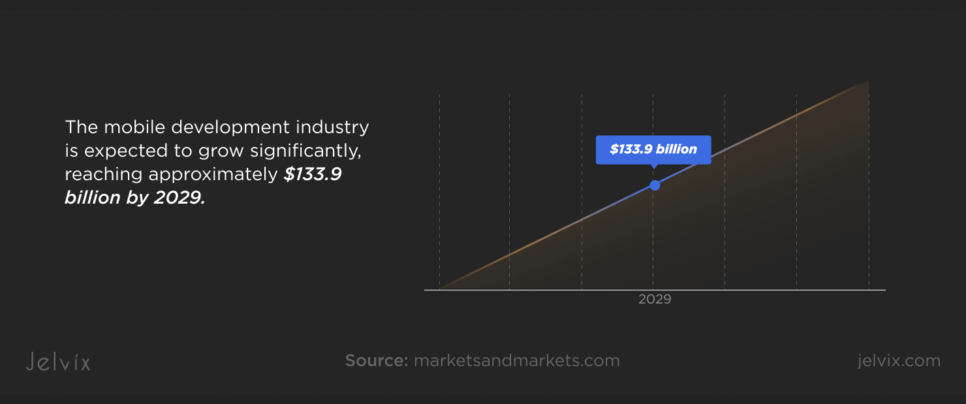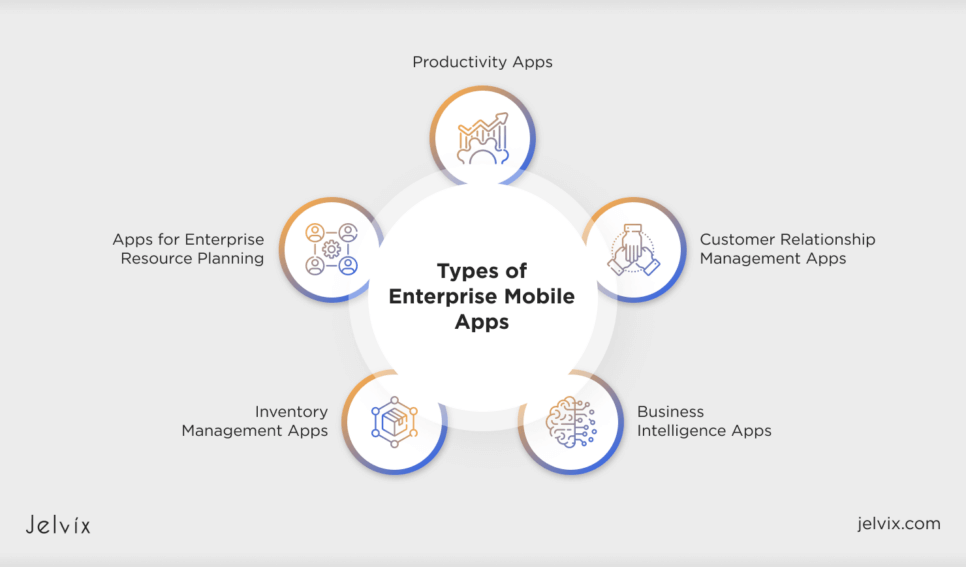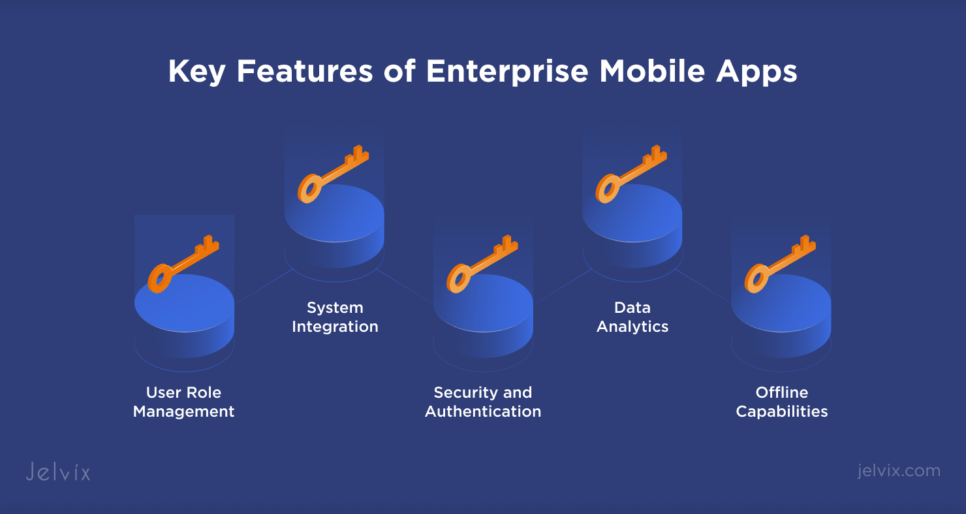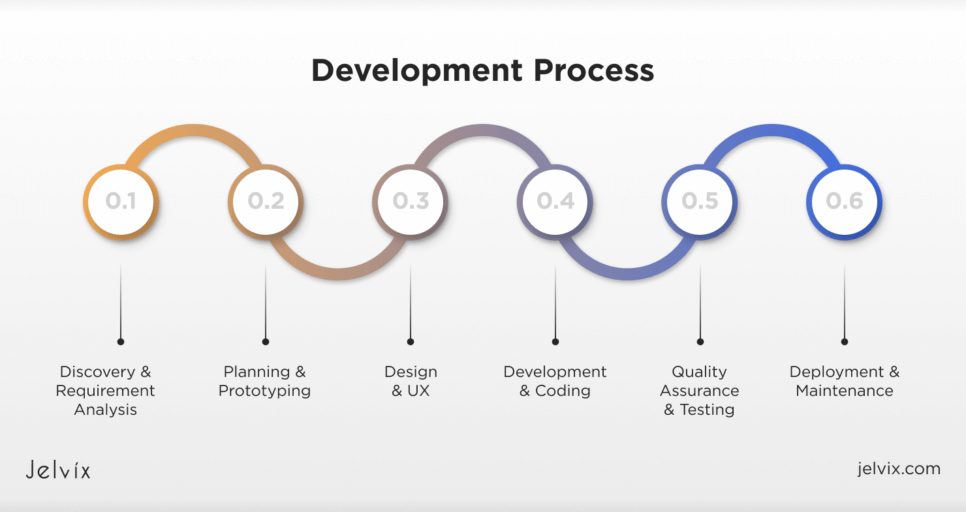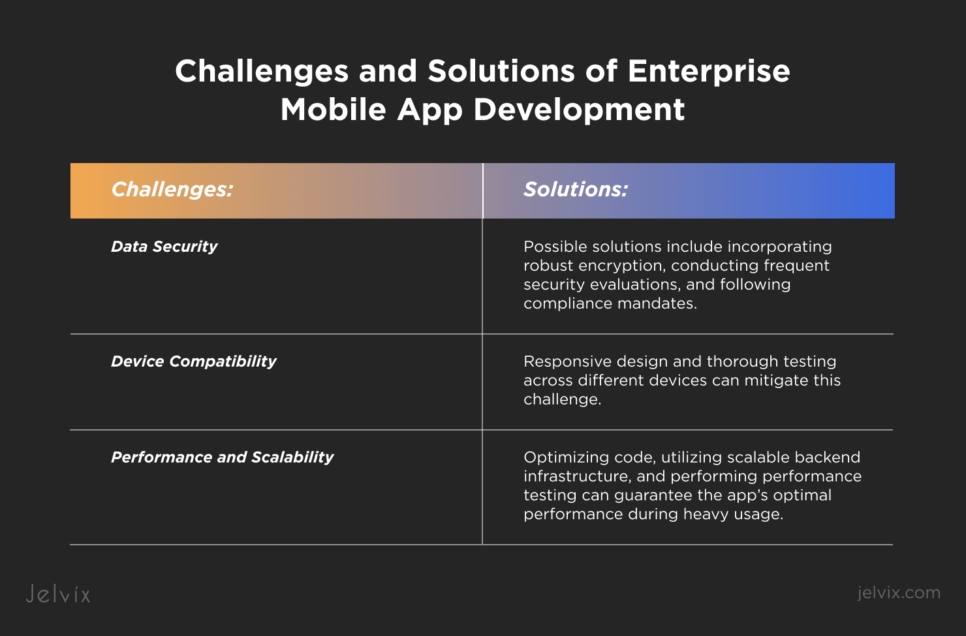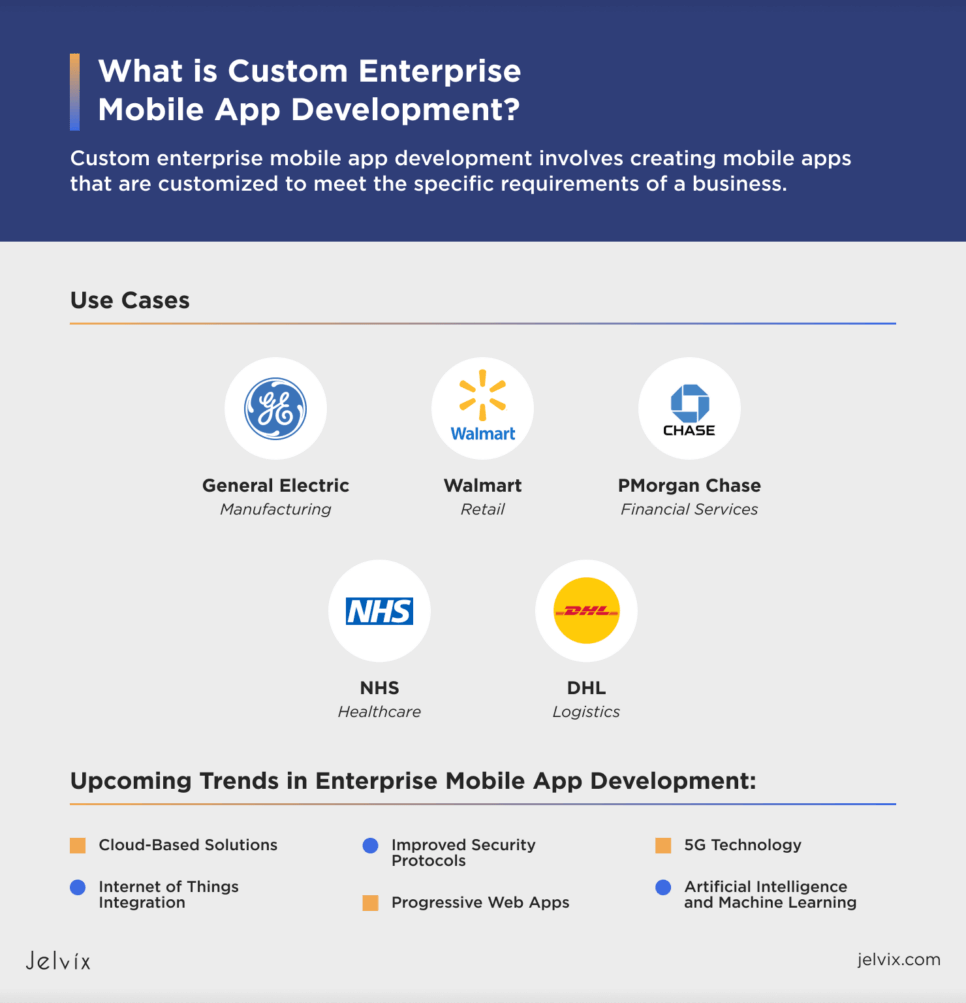Recent data suggests an increasing demand for businesses to acquire tailored mobile app development services. The mobile development industry is expected to grow significantly, reaching approximately $133.9 billion by 2029, with a 13% compound annual growth rate expected over the forecasted period. This rise highlights the growing importance of mobile applications in optimizing business operations and enhancing employee productivity.
In this article, we will explore:
- What custom mobile applications are;
- Their main characteristics for enterprises;
- The process of developing mobile apps;
- The difficulties and resolutions in enterprise app development.
What is Custom Enterprise Mobile App Development?
Custom enterprise mobile app development involves creating mobile apps that are customized to meet the specific requirements of a business. Tailored mobile applications assist enterprises in managing intricate procedures, obtaining up-to-date information, streamlining remote work configurations, and enhancing overall productivity.
Whether completely personalized or partially tailored, these applications provide capabilities and features that standard solutions cannot match.
Types of Enterprise Mobile Apps
Enterprise software comes in a variety of shapes and sizes. Nonetheless, the main objective of enterprise mobile apps is to enhance users’ productivity at work by offering them appropriate tools when they need them.
Productivity Apps
Productivity tools are designed to enhance employee efficiency by simplifying activities such as scheduling, project management, and communication. They enable employees to perform their duties with greater effectiveness, enhancing productivity on the whole.
Customer Relationship Management Apps
CRM applications assist businesses in handling engagements with existing and potential clients. These applications offer capabilities for managing sales, managing customer information, and communicating, leading to improved customer service and loyalty.
Apps for Enterprise Resource Planning
ERP applications consolidate different business functions within a single system. They offer up-to-date data on finances, supply chain, manufacturing, and other activities, streamlining decision-making and resource management.
Inventory Management Apps
Inventory management apps help companies manage inventory levels, purchases, and deliveries. These applications minimize mistakes, enhance stock levels, and enhance supply chain effectiveness, allowing companies to satisfy customer demands without overstocking.
Business Intelligence Apps
BI applications examine data and offer actionable insights. They assist companies in making well-informed choices by displaying data in a user-friendly manner, like through dashboards and reports.
Key Features of Enterprise Mobile Apps
Make sure to focus on the key features needed for a business app before starting to create a custom application. Below are the main distinctions between custom development and standard solutions.
Security and Authentication
Security is of utmost importance in personalized enterprise mobile applications, as opposed to generic business apps that may lack adequate security measures. These applications utilize robust encryption and authentication methods to protect important company information from unauthorized breaches. Moreover, Mobile Device Management (MDM) servers are frequently used in corporate settings. MDM servers provide centralized management of devices, enabling remote implementation and enforcement of security policies.
Within the enterprise sector, applications can be distributed outside of the App Store or Play Market if needed. This is achievable using platforms such as the Apple Developer Enterprise Program, which enables in-house app distribution without the need for public app store publication.
User Role Management
Complex user role management is often necessary for enterprise mobile apps to guarantee proper access levels and permissions, which are contingent upon user roles in the organization. This functionality permits customizable access control, granting various functions and data visibility based on the user’s role and duties.
System Integration
Custom apps can be designed to integrate with your existing systems, including ERPs and CRMs. Data remains consistent and accessible without data separation and operational interruptions. System integrations provide a unified technological environment that supports all business activities and decision-making procedures.
Discover the essentials of system integration and how it streamlines business operations by connecting software, applications, and data.
Data Analytics
Data analytics capabilities help companies collect and analyze data from a variety of sources. This feature of customized mobile apps helps make decisions based on detailed data to recognize patterns and improve business strategies.
Offline Capabilities
Thanks to mobile apps’ offline functionalities, users can access and utilize the app without an internet connection. This function is essential for employees working in distant areas or places with poor internet connectivity.
Development Process
After you have identified the required type and features for your app, you can start creating the mobile application. Whether you decide to create a custom application in-house, delegate the development to an external party, or purchase a pre-built solution, the custom app development process resembles other software development approaches.
Discovery and Requirement Analysis
Understanding the requirements and goals of the business is where the development process begins. This phase involves gathering requirements, identifying key features, and defining the project’s scope.
Planning and Prototyping
During this stage, you will need to establish a comprehensive plan that includes the development steps, schedules, and necessary resources. Prototyping will help you depict the app’s features and collect input before advancing to full-scale development.
Design and UX
This stage is about designing the look and feel of your future app. You can start by creating simple sketches to display basic layouts and user flows. Then, you can move on to detailed mockups that include your app’s visual design elements. A good design enhances user experience by making the app easy to navigate.
Development and Coding
This stage consists of coding and creating the app’s features. Programmers utilize a variety of programming languages and tools to create a durable and scalable application. For more information, see Technologies Used in Enterprise Mobile App Development below.
Quality Assurance and Testing
Quality assurance guarantees that the app is free of bugs and functions as anticipated. Testing involves conducting functional, performance, and security tests to detect and address any potential issues.
Deployment and Maintenance
Following the testing phase, the app is released on the planned platforms. Consistent maintenance and updates are essential to guarantee the app stays operational and safe.
Technologies and Languages in Enterprise Mobile App Development
Various technologies and languages are involved in building mobile apps that are robust and secure. These cover backend and frontend development, data security, and the integration of emerging technologies.
Backend Programming Languages
While different programming languages can be used for the backend, languages such as Java, C++, and Rust are often preferred for optimal performance and security. These languages provide robustness and effectiveness that are crucial for managing the size and complexity of applications at the enterprise level.
Data Security Measures
Ensuring the security of data is a crucial element of developing enterprise mobile apps. It requires adhering to strict encryption protocols and securing API connections. Furthermore, it is essential to adhere to regulatory requirements such as GDPR and HIPAA to safeguard sensitive information and comply with the law.
Emerging Technologies
The integration of innovative technologies such as Artificial Intelligence (AI), Machine Learning (ML), and the Internet of Things (IoT) is enhancing mobile business applications. These technologies improve user experiences and provide advanced features.
Native vs. Cross-Platform Mobile Development
Businesses must consider such factors as budget, timeline, target audience, and app performance when choosing between native and cross-platform development. Developing applications for a single platform, such as iOS or Android, through native development guarantees excellent performance and user satisfaction. Cross-platform apps can function on both iOS and Android.
Both methods have their advantages and disadvantages. Native development requires more resources and is more challenging to upkeep because of distinct applications and development teams. However, utilizing the device’s native features and technology specific to the platform can enhance the user’s experience.
Learn the differences between native and cross-platform development to find the best fit for your business.
The cross-platform development process is quicker. The reusable code for both iOS and Android reduces the need for multiple development teams. Still, it may not meet the performance and user experience standards of native apps. Cross-platform development tools like React Native enable developers to create the central components of an application just once, delivering a native-like user experience on various platforms. However, cross-platform apps might suffer from performance issues and architectural complexities.
Challenges and Solutions of Enterprise Mobile App Development
When developing mobile apps for businesses, it is crucial to carefully examine and tackle different obstacles and their respective resolutions to ensure successful app creation.
Data Security
Ensuring data security poses a major challenge. Possible solutions include incorporating robust encryption, conducting frequent security evaluations, and following compliance mandates.
Device Compatibility
Ensuring compatibility with various devices and operating systems is crucial. Responsive design and thorough testing across different devices can mitigate this challenge.
Performance and Scalability
Enterprise applications need to manage substantial volumes of data and users. Optimizing code, utilizing scalable backend infrastructure, and performing performance testing can guarantee the app’s optimal performance during heavy usage.
Use Cases
Enterprise mobile applications have become essential instruments for companies in different industries. The following successful implementations showcase the varied uses of enterprise mobile apps.
Retail: Walmart
Walmart utilizes a customized mobile application to improve customer and employee interactions. With the app, employees can efficiently handle inventory, monitor shipments, and help customers better. In addition, it lets customers scan products for pricing and stock information, resulting in a faster shopping experience. Incorporating mobile technology has enabled Walmart to enhance its operational effectiveness and customer contentment.
Healthcare: NHS
NHS in the UK has created a mobile application for its healthcare staff. Healthcare providers can access patient data, schedule appointments, and manage prescribed medications. The application improves the quality of care and operational efficiency with instant access to important information.
Manufacturing: General Electric
General Electric (GE) has created a mobile application for its service technicians. The app offers technicians detailed equipment information, maintenance records, and diagnostic tools. Repairs and maintenance become more efficient, downtime is reduced, and productivity is increased. The application allows for real-time reporting and communication with central offices, ensuring that all stakeholders are informed about ongoing operations.
Logistics: DHL
DHL enhances its logistics and supply chain operations with a specialized mobile application. Using the application, drivers can view updated delivery schedules, monitor shipment progress, and make real-time updates to delivery statuses. Therefore, the logistics process is clear and effective, minimizing delays and enhancing customer satisfaction.
Financial Services: JPMorgan Chase
JPMorgan Chase developed a mobile banking application with features such as secure account access, fund transfers, bill payments, investment tracking, and advanced security tactics such as biometric authentication and encryption to protect customer data. This has enhanced customer happiness and increased the utilization of digital banking services.
Upcoming Trends in Enterprise Mobile App Development
As per Statista, the expected trends in business mobile app creation for 2024 involve an increased usage of AI tools, the growth of IoT devices requiring fast connections through edge data centers, enhancements in AI-driven smartphones, and various other advancements.
Artificial Intelligence and Machine Learning
AI and ML are transforming business mobile applications by offering personalized user experiences, predictive insights, and smart automation. AI-driven chatbots and virtual assistants are becoming common tools, helping businesses improve customer service and operations. ML algorithms analyze vast datasets and provide guidance for strategic decisions. Device manufacturers are actively integrating ML cores into their products and are already pushing AI at the operating system level.
Internet of Things Integration
Combining IoT with mobile applications allows for immediate collection and analysis of data from connected devices. This trend is especially remarkable in the manufacturing, healthcare, and logistics sectors. IoT-enabled mobile applications can effectively monitor equipment health, trace asset locations, and efficiently manage supply chain operations. Smart sensors in a factory could send live data to a mobile application, enabling proactive maintenance and minimizing downtime.
Improved Security Protocols
The importance of data security has increased due to businesses relying heavily on mobile apps for crucial activities. Cutting-edge security features like multi-factor authentication (MFA), biometric verification, and end-to-end encryption are becoming more and more common. Moreover, blockchain technology is being scrutinized for enhancing transaction security and facilitating data sharing through the establishment of an immutable and easily accessible ledger.
Progressive Web Apps
PWAs are gaining popularity because they can provide a comparable experience to native apps on a web browser. Such apps offer several advantages, including reduced development costs, easier upkeep, and broader accessibility across different devices and platforms. They are particularly advantageous for companies looking to broaden their audience without investing heavily in developing native apps.
5G Technology
The implementation of 5G technology is changing mobile app development by increasing data transfer rates, decreasing latency, and improving connectivity. This will enable the development of more sophisticated mobile apps, such as augmented reality (AR) and virtual reality (VR) experiences, real-time collaboration tools, and enhanced video streaming services. Companies can use 5G to create applications that need fast data processing and high bandwidth.
Cloud-Based Solutions
The development and implementation of business mobile applications are being transformed by cloud computing. Cloud-based solutions enable businesses to easily expand, remain adaptable, and reduce expenses, enabling them to effectively handle their applications. By making use of cloud services, businesses can ensure that their mobile applications are always available, up-to-date, and equipped to handle vast quantities of data.
By keeping current with trends, companies can utilize the latest technologies to create cutting-edge mobile apps that boost growth and enhance operational efficiency.
Conclusion
Modern businesses require custom enterprise mobile apps for improved productivity, better data management, and enhanced customer engagement. The development consists of multiple steps, from analyzing requirements to deployment and maintenance. Choosing the right technologies and development approach is crucial for the application to succeed.
To ensure a successful outcome, companies looking to develop customized mobile apps should consider collaborating with experienced developers like those at Jelvix. Contact our experts for custom mobile application development services.
Frequently Asked Questions
Q1: Can a custom enterprise mobile app integrate with our existing systems?
Indeed, custom applications are specifically created to seamlessly mesh with current corporate systems like ERPs, CRMs, and other tools, ultimately improving efficiency and data flow.
Q2: How do we start developing a custom enterprise mobile app?
Typically, the process begins with a meeting to grasp your business needs, followed by requirements analysis, planning, prototyping, design, development, testing, and ultimately deployment.
Q3: Can we see a prototype before the final development?
Yes, creating a prototype is a common procedure. It lets you see the app, try out its features, collect input, and make necessary changes before completing development.
Q4: What benefits does my business receive from investing in a personalized enterprise mobile application?
There are various benefits of investing in a custom business mobile app, including improved productivity, better data management, increased customer engagement, and a competitive advantage.
Q5: What steps do you implement to ensure the security of mobile applications for business?
Security is guaranteed by strong encryption, dependable user authentication, frequent security evaluations, and adherence to industry standards and regulations.
Searching for a Trusted Partner in Custom Mobile App Development?
Access top talent to develop custom mobile applications that optimize operations and enhance business productivity.


